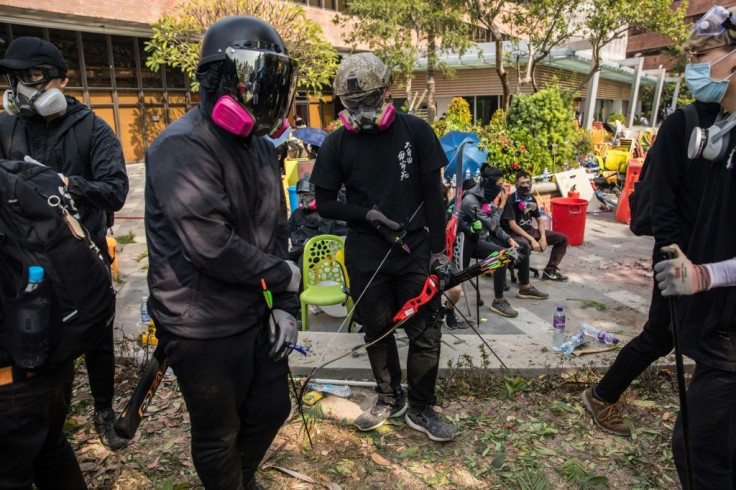Hong Kong Protests Update: US Senate Prepares To Fast-Track Hong Kong Bill As Demonstrations Escalate

In response to worsening violence in Hong Kong, the U.S. Senate is preparing to pass legislation that would support pro-democracy protesters by redefining Washington’s relationship with the China-controlled city.
Spearheaded by Sens. Marco Rubio and Jim Risch, the Hong Kong Human Rights and Democracy Act would compel the U.S. secretary of state to certify Hong Kong has enough autonomy to allow for special U.S. trading considerations. The certification would need to be done at least once a year.
Such autonomy, the bill stipulates, would be determined by the Hong Kong government’s powers to make decisions independently on such matters as human rights, law enforcement and extradition requests, universal suffrage, judicial independence, police and security functions, export controls, and sanctions enforcement.
The bill also would impose sanctions on Chinese and Hong Kong officials who are deemed to have committed human rights violations in Hong Kong.
The bill would require the administration to form a strategy to protect U.S. citizens and other people in Hong Kong from rendition or abduction to China.
The new bill builds on 1992’s Hong Kong Policy Act which permits the U.S. to consider Hong Kong as a separate entity from mainland China with regard to trade and export following Britain’s 1997 handover of Hong Kong to China.
If the bill passes in the Senate, politicians would still have to make compromises over any differences between this proposal and a similar bill the House of Representatives passed in October.
“The world witnesses the people of Hong Kong standing up every day to defend their long-cherished freedoms against an increasingly aggressive Beijing and Hong Kong government," Rubio said. “Their cries have been met with violence, and young Hong Kong lives have tragically been lost.”
Rubio added that now the U.S. “must send a clear message to Beijing that the free world stands with Hong Kongers in their struggle.”
Beijing has already criticized the bill.
Chinese Foreign Ministry spokesman Geng Shuang warned if this law passes, “it won’t only harm Chinese interests and Sino-U.S. relations, it will seriously harm the United States’ own interests. On the wrong actions of the U.S. side, China will inevitably take vigorous measures to firmly respond, to staunchly safeguard our sovereignty, security and development interests.”
Meanwhile, Hong Kong’s Education Bureau has closed all schools as a safety precaution. The bureau also criticized protesters, citing “extensive damage to society caused by violent protesters in the last couple of days,” and “strongly condemned those acts which deliberately endanger students' safety.”
Similarly, The Chinese University of Hong Kong, which has witnessed violence between police and protesters, said it has called off all classes, due to the “escalation of social movements across the territory, the continuous disruption to public transport services, as well as the severe damage done to facilities on campus.” The university said the closure will last until Jan. 6.
The university further condemned the violence on its own campus, which featured protesters tossing gasoline bombs and “injurious objects” at police, who responded with “volleys of tear gas and rubber bullets.” The university also said “a number of colleagues and students were injured in these incidents.”
Beijing’s liaison office in Hong Kong has responded to the spiraling violence by calling for a tougher crackdown on protesters.
© Copyright IBTimes 2024. All rights reserved.





















